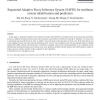Free Online Productivity Tools
i2Speak
i2Symbol
i2OCR
iTex2Img
iWeb2Print
iWeb2Shot
i2Type
iPdf2Split
iPdf2Merge
i2Bopomofo
i2Arabic
i2Style
i2Image
i2PDF
iLatex2Rtf
Sci2ools
144
click to vote
FSS
2006
2006
Sequential Adaptive Fuzzy Inference System (SAFIS) for nonlinear system identification and prediction
In this paper, a Sequential Adaptive Fuzzy Inference System called SAFIS is developed based on the functional equivalence between a radial basis function network and a fuzzy inference system (FIS). In SAFIS, the concept of "Influence" of a fuzzy rule is introduced and using this the fuzzy rules are added or removed based on the input data received so far. If the input data do not warrant adding of fuzzy rules, then only the parameters of the "closest" (in a Euclidean sense) rule are updated using an extended kalman filter (EKF) scheme. The performance of SAFIS is compared with several existing algorithms on two nonlinear system identification benchmark problems and a chaotic time series prediction problem. Results indicate that SAFIS produces similar or better accuracies with less number of rules compared to other algorithms.
| Added | 12 Dec 2010 |
| Updated | 12 Dec 2010 |
| Type | Journal |
| Year | 2006 |
| Where | FSS |
| Authors | Hai-Jun Rong, N. Sundararajan, Guang-Bin Huang, P. Saratchandran |
Comments (0)

